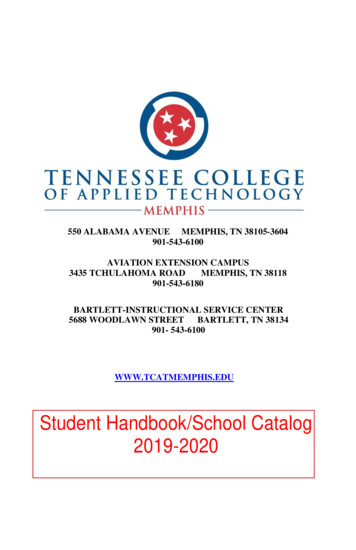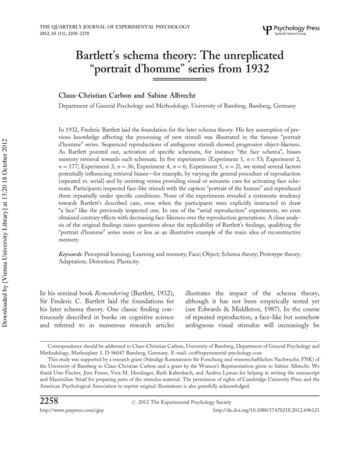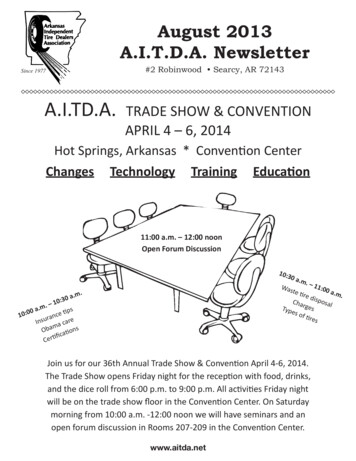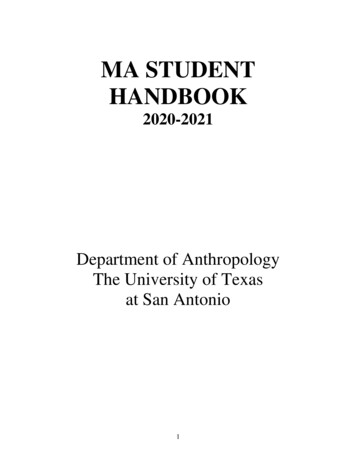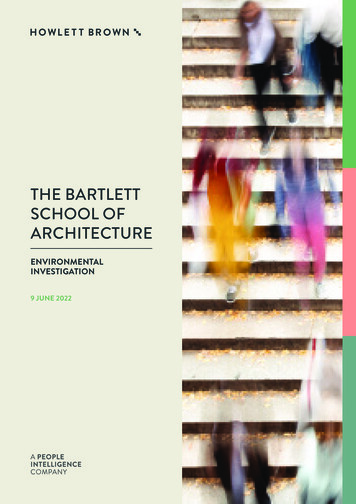
Transcription
THE BARTLETTSCHOOL OFARCHITECTUREENVIRONMENTALINVESTIGATION9 JUNE 2022
2SYNOPSISWe, Howlett Brown, were appointed by UCL as the specialist, impartial investigator to conduct an environmentalinvestigation into reports and concerns raised by current and former students and staff relating to the culture,educational practices and environment at the BSA.On or around 19 April 2022, we concluded the investigative phase of our investigation, following which wedetailed our findings and conclusions, including the recommendations issued to UCL, set out in this Report.Our investigation was extensive and thorough, based on the relevant evidence obtained and reviewed, andassessing such evidence on the balance of probabilities.This Report contains our findings, themes drawn from participant interviews and focus groups, and an overviewof further relevant evidence identified; it is only intended to be a summary which sets out the relevant extractsof the documents reviewed, the results of the survey we conducted, BSA and UCL relevant survey data(current and historic), the individual participant interviews and focus groups held.Regarding such interviews and focus groups, this Report is not, nor is it intended to be, a full verbatim account ofwhat was said by all participants. Identifying personal data and characteristics of all participants and individualsnamed have gone through the process of anonymisation for the purposes of this Report. The process undertakenin investigating the concerns raised and reports made is detailed further in this Report.SAFETY AND TRIGGER WARNING REGARDINGTHIS REPORT FROM HOWLETT BROWNWe warn any person reading this Report that it contains summaries, quotes and references from participantsof the environmental investigation that may be upsetting, harmful or triggering for the reader. These includeexamples and experiences described, labelled and categorised by participants as relating to harassment(including sexual harassment), bullying, racism, microaggressions, gaslighting, toxic learning and teachingculture, low psychological safety and the emotional impact that those experiences have had on theindividuals involved.If any person reading this Report feels vulnerable, unsafe or unwell, before or whilst reading this Report, werecommend and urge the reader to cease reading the Report and take steps to support their mental health,wellbeing and overall psychological safety. This may include the reader seeking support, guidance orhaving a companion in their presence at the time they read the Report or any other action or considerationthey determine would be helpful in supporting their wellbeing.We recognise that a trigger warning such as this may also be triggering. That said, we felt it was necessaryto include this warning based on the findings and conclusions of our investigation and the summary ofexperiences and evidence contained in this Report.
3ABOUT HOWLETT BROWNHowlett Brown is a people intelligence company specialising in investigations, culture, diversity, equity andinclusion and people advisory solutions. We house global, multi-jurisdictional and cross-industry expertise thatprovides a holistic and blended approach to investigations, diversity, equity and inclusion, and culture serviceswith legal, governance, compliance, and communications support.We are authorised by the Solicitors Regulation Authority (“SRA”). Because of our regulatory status withthe SRA, we have regulatory and ethical standards and requirements to uphold that surpass commercial standardsand expectations, unlike other investigation, culture and diversity, equity and inclusion providers. We take pridein pulling together these various skills and disciplines to provide unique insights and depth to our investigationsand reviews.For more information, visit www.howlettbrown.com.
4LETTER TO PARTICIPANTS FROM HOWLETT BROWNDear Participants,As the specialist impartial investigator appointed to investigate reports and concerns raised by students and staff(current and former) relating to the culture, educational practices and environment at the BSA, we wanted to thankyou for your patience and candour during this investigative process.We commend any organisation willing to be transparent and appoint external specialists to fully understand theirculture and issues that may be unresolved or unknown to many but felt with such gravity personally to thoseinvolved. Whilst that decision for an organisation is important and necessary, real understanding and changecannot come without those willing to discuss their insights and experiences. We therefore could not havecompleted our work with the depth we have, without your involvement. Your input has not been underestimated.We recognise the courage and vulnerability required to speak up and share experiences, particularly topeople you do not know well. We appreciate and respect the time, effort and trust you have placed in us by sharingyour experiences.As you know, the original early 2022 timeline for the Report delivery was extended to allow for further examinationinto the overall culture at the BSA, including to allow more time for those who wished to speak to us during theinterview phase of our environmental investigation to do so. For those who wish to access support or report furtherconcerns we have noted the below information provided to us by UCL:a. UCL’s Report Support online tool which we understand will continue to be accessible to staff and alumnishould they wish to raise concerns.b. A dedicated Bartlett School of Architecture Employee Assistance Programme (EAP) helpline, 0333 212 3183,that has been secured to provide confidential, emotional support, free counselling, advice, and informationfor former Bartlett School of Architecture students and staff who have been impacted by the findings of theRreport.c. The above will be in addition to the continued provision of UCL’s Employee Assistance Programme (EAP)which is accessible by all UCL staff and students 44 (0) 800 197 4510.This Report, inclusive of our findings and recommendations concludes our work. We hope that our recommendationshelp support continued and enhanced positive change at the The Bartlett School of Architecture, and we trust thatthe information contained in the Report demonstrates the depth of our listening, understanding and assessment ofthe various factors that have shaped your experiences.One of our recommendations to UCL is to thoroughly investigate some of the allegations made during thisinvestigation about some members of staff at the BSA. In order for UCL to commence these investigations, it willrequire those who are willing, to come forward and go on the record with their allegations. We acknowledge thatthis investigation has already challenged many of you. However, we urge you, should you be willing, to seriouslyconsider taking the step to formally record your allegations so that UCL are given full access to your experiences
5and can begin the process of addressing your concerns fully and robustly. Even without your formal record ofcomplaint, UCL will proceed with investigating the allegations we have identified to them as giving us seriouscause for concern, however, without a formal recording of your complaints, UCL has a more difficult task in beingable to thoroughly investigate your concerns and take any appropriate action thereafter.We respect and recognise the anticipation surrounding this work and the frustration regarding how long large andcomplex investigations such as this can take.We thank everyone who participated in this investigation. It is with the highest of standards, respect and care thatwe have treated this matter.Yours sincerely,HOWLETT BROWN
6CONTENTS07SECTION AIntroduction11SECTION BScope of Investigation14SECTION CThe Methodology of an Environmental Investigation20SECTION DRelevant Context and Timeline30SECTION EPositives33SECTION FOutcome44SECTION GRecommendations50SECTION HThemes95SECTION ISchedules
SECTION AINTRODUCTION
8INTRODUCTION1. The BSA has approximately 347 staff withemployment contracts at UCL, approximately 30 percent of whom are full time. In addition to this, thereare contractors (not under an employment contractwith UCL) who are involved in teaching and havedirect contact with students and responsibility fordelivering teaching to them on a regular basis. TheBSA also employs PGTAs, or PhD students, whosupport teaching activities under the PGTA Codeof Practice. It is understood that they also employteachers without PhDs, who then go on to studyfor their PhD part-time and therefore teach whilethey continue to study. The BSA also makes use ofGTAs and post graduate taught students are paidto help with undergraduate teaching.2.We understand that the BSA currently has approximately 1,743 students (622 Undergraduates;1027 Postgraduate taught; 94 Postgraduateresearch). It is understood that the vast majorityof the taught students study full time. TheBSA programmes cover a broad spectrum ofarchitecture-related subjects. In addition to designstudio teaching in units, there is also seminarteaching for history and theory, and workshopbased skills teaching for materials and making.3. The BSA has, over several years, receivedcomplaints and concerns, both formal and informal,on the record and anonymously, from current andformer students and staff about their experiencesat the BSA. According to UCL, this included informaldiscussions with students regarding concerns thatsome members of staff were not “accounting forthe circumstances of individual students” andexperiences of aggressive teaching practices.For staff, concerns of not feeling respected andsupported were identified in the UCL 2015 Staff
9Survey which the BSA participated in, as partof the Dignity at Work Action Plan. The surveyhighlighted five areas of concerns, which were thatrespondents:6. We were appointed by UCL as the specialist,impartial investigator to conduct an environmentalinvestigation into reports and concerns raisedby both current and former students and staffrelating to the culture, educational practices andenvironment at the BSA.a. depending on their gender and in respect ofpersonality and cultural differences;b. felt that a different value is given to academic staffover professional services staff and that there is alack of recognition or respect for work delivered bythe latter;c. expressed a sense of being undermined throughuneven workload distribution, and through poorlistening skills by senior staff, including managers;d. also felt that the culture of communication amongststaff was at times rude or aggressive, both verballyand in emails;e. had a belief that some senior staff appeared tooperate within ‘cliques’ which resulted in apparentfavouritism, secrecy and a lack of openness indecision making, and/or work allocation.4. These concerns were published in a 2017 reviewand the BSA responded to state that “strong actionswere taken and [remain] ongoing” to address theseissues, including “a number of actions to improveawareness on expected behaviours and beingrespectful to others” and, more recently, “rollingout ‘Where do you draw the line?’ training, alongwith increasing awareness of dignity advisors.”5. On or around 1 June 2021, news media outlets,including the Guardian and the Architect’s Journal,published articles which referenced the existenceof a Dossier containing multiple allegations ofbullying, harassment (including sexual harassment),racism and sexism at the BSA. The articles detailedthe nature of the alleged incidents but did not revealthe identity of the Dossier participants. Thesearticles raised several concerns and allegationsregarding the conduct, behaviour and the broaderculture at the BSA. The specific details of thoseconcerns and allegations are detailed in the Scopeof the Investigation section of this Report.INVESTIGATIONCOMMENCED20 October 2021INVESTIGATIVE WORKCONCLUDED19 April 20227. We commenced our investigation on or around20 October 2021, with our investigative phaseof work concluding on or around 19 April 2022.We reached our findings and conclusions,including the recommendations issued to UCLset out in this Report, following an extensive andthorough environmental investigation, based onthe relevant evidence obtained and reviewed,and assessing such evidence on the balanceof probabilities.8. This Report contains our findings, themes drawnfrom participant interviews and focus groups,policies and procedures applicable to the BSA,and an overview of further relevant evidenceidentified. It is only intended to be a summarywhich sets out the relevant extracts of thedocuments reviewed, the results of the surveywe conducted, BSA and UCL relevant survey data(current and historic), the individual participantinterviews and focus groups held. Regardingsuch interviews and focus groups, this Reportis not, nor is it intended to be, a full verbatimaccount of what was said by the participants.Identifying personal data and characteristics ofall participants and individuals named have gonethrough the process of anonymisation for thepurposes of this Report.
109. In this Report, we have provided recommendationsthat:a. Are meaningful, practical and add valueto the BSA.b. Support a positive learning and workplaceculture.c. Raise standards internally in the Equity,Diversity and Inclusion (EDI) context(as described further below).10. This Report was commissioned by ProfessorSasha Roseneil, Pro-Provost (Equity and Inclusion)and later, Professor Anthony Smith, Vice Provost(Faculties) at UCL.
SECTION BSCOPE OF INVESTIGATION
12SCOPE OF INVESTIGATION11. We were appointed to conduct an environmental investigation into reports and concerns raised by studentsand staff (current and former) relating to the culture, educational practices, and environment at the BSA.Regarding the specific scope of the investigation, our remit was to understand:a. What specific behaviours were being allegedb. Whom these behaviours were against (if appropriate)c. The context of the confidential complaintsd. Who are the individuals who have exhibited the alleged behaviours (if appropriate)e. Whether these allegations are witnessed by people prepared to be on the recordf. The broader culture of the teaching, learning and working environmentg. Whether there are specific factors that lead to an environment in which discriminationand/or harassment on the basis of sex and race allegedly occurh. Any other factors that may impact the culture and environment in the department,including barriers to reporting and lack of support
1312. The investigation also focused on the followingareas:13. Regarding the recommendations, UCL requestedthat where appropriate we make recommendations:a. The experiences of current staff, studentsand alumni (both staff and students)a.Where further investigations shouldbe progressed under an informal/formalprocess (e.g., Disciplinary Procedure).b. The specific cultural drivers that give riseto the behaviours that have been reportedb. On how the environment and culture maybe improved, with a focus on the diversityand inclusion aspects initially reported.c. Workplace culture within the BSA,specifically if there were allegations ofdiscrimination or harassment such asfollows:i. Allegations ofharassment/bullying behavioursii.Allegations that tutors encouragea “drinking culture”, which resultsin an inappropriate blurring ofpersonal and professionalboundariesiii. Allegations of inappropriatecommentsiv.Allegations of race and sexdiscrimination and practicesfavouring individuals from affluentbackgroundsv. Allegations of an inappropriateeducational environmentvi. Allegations of sexual relationshipsbetween staff and students, contraryto the Personal Relationships Policyvii. Presence of a hostile workingenvironmentviii. A disproportionate and detrimentalimpact to the professional careersof those who identify as womenor people of colourc. That would be to the overall benefit of theBSA, including interventions and additionalsupport where required.14. In order to fully understand, assess and makerecommendations (where appropriate) regardingthe improvement of the culture at the BSA and theexperiences of people of a particular demographicbackground, we also assessed the BSA’s culturefrom a diversity, equity and inclusion perspective.
SECTION CTHE METHODOLOGY OFAN ENVIRONMENTALINVESTIGATION
15THE STAGES OF REVIEW15. The investigation was conducted in four stages.The first stage of the investigation was to gain anunderstanding of UCL and the BSA. We learnedabout the BSA’s history and purpose. We spoke torepresentatives of BSA leadership, management,and stakeholder staff across the BSA and UCLand learned about UCL services which the BSAuses, such as, ‘Report and Support’ the platformfor reporting concerns and complaints. We alsolearned about the BSA and UCL’s EDI practicesand initiatives, to better understand the structuraland procedural aspects of the BSA.STAGE 116. The second stage of the investigation was in twoparts. The first part was a document review, lookingat BSA policies, procedures, communications, andother documents relevant to the concerns andreports raised, and BSA’s culture. Such documentswere provided to us by our key point of contact atUCL or the participants directly.STAGE 2:PART 117. Part two of the second stage was to conductinterviews and focus groups with participants.These provided us with the opportunity to hearthe contextual experiences of participants whichincluded current and former students and staff.Interviews were conducted on an individual basisand focus groups were conducted with no morethan ten participants per focus group.STAGE 2:PART 2
1618. Participants were engaged via communicationsissued by UCL to current and former staffand students, notifying them of our appointmentand the Howlett Brown email address we hadcreated for people to express their interest toparticipate. Following interest from participantswho made direct contact with us, we liaisedwith participants on a confidential basis directlyand triaged each notification and expressionto participate that we received. During thistriage process we determined whether, basedon the information shared, it would be moreappropriate to conduct an individual interviewor a focus group discussion. The interviewphase of this investigation commencedin October 2021 with communications issuedto current and former students and staff atthat time. The original closure date of theinterview phase was 18 February 2022;however, this was extended until the endof April 2022 to allow for any additionalinterviews to take place, ensuring a thoroughand thoughtful process. During this extendedperiod, additional communications were issuedto current and former students and staffregarding the extension and deadline. Finally,we allowed those who preferred, to issuewritten submissions about their experience.19. The interview deadlines and our survey werecommunicated to current and former staffand students in good time. This was part ofUCL’s commitment to being flexible to thosewho wanted to participate in the investigationand to allow us time to thoroughly investigatethese concerns. This proved helpful as, afterthe original deadline, we received a furthersix additional written accounts, conducted 15additional interviews and received five additionalrequests for interviews. For the remainingfive interviews, we were unable to meet withthem due to the finalising of this Report butoffered the opportunity to those people to issuewritten submissions.20. Whilst we intended to speak to all individualswho had expressed their interest to participate,we assessed which discussions would be moreappropriate to have on an individual interviewbasis, rather than a focus group. We did thison the basis of our experience of conductinginvestigations, knowing that interviews can ofteninvolve personal and sensitive experiences beingshared. The strongest determining factor for uswas the gravity of the experience or severity of thecircumstances or incidents shared by the personexpressing an interest by email. As noted above,we also provided flexibility to the participants whochanged their mind regarding their participationin the investigation or had a preference for themanner in which they engaged with us, suchas a strong desire to speak on an individualbasis rather than a focus group discussion orto submit their insights and experiences inwriting by email.21. Interview and focus group questions weredrawn from the previous information gatheredabout the BSA, any themes that arose from thedocument review, the survey we conducted(as detailed further below), the informationshared by the participants during their emailcorrespondence with us and our experienceof conducting environmental investigationsand cultural reviews. During this investigationwe held 49 individual interviews, 8 focusgroup discussions covering 10 participants,and received 8 written submissions. We alsocan confirm that there were 303 respondents toour survey.
1722. During the third stage of review, we took steps todeepen our understanding of the culture and thestrategic and value-based importance the BSAplaces on EDI by conducting further individualdiscussions with stakeholders and leaders, aswell as UCL staff. This assessment includedunderstanding the progress made to addressprevious concerns raised regarding the BSAculture, the initiatives and strategies deployed toimprove culture, and insights available from Reportand Support.23. The fourth stage was an analysis of all theinformation that we had gathered and processedthroughout the earlier stages and distilling thatinformation and learning into key themes andrecommendations for the BSA. Our findings werealso collated and assessed, paying attention tocultural and social insights from an industry, EDIand societal context, as well as our expertise ofconducting investigations, culture reviews andbroader cultural related services, as explainedfurther below.STAGE 3STAGE 4
18THE BASIS OF THE THEMESAND EXAMPLES REFERREDTO IN THIS REPORT24. We note that any theme referred to andsummarised in this Report is based on ourassessment of all the evidence, including theresults from our survey and participant responses,and identification of common themes and findingsacross all forms and types of evidence collatedduring the investigation. Where outlier examplesof experiences and alleged incidents exist, theseare referenced in the Report where there issome commonality with the themes referencedor where the experience or alleged incident isimportant to reference for the purposes of theenvironmental investigation.ANONYMITY25. All participants and individuals named duringindividual interviews and focus groups held havebeen anonymised, and any identifying factorsremoved in this Report. The individuals named inthe alleged incidents or experiences referencedin this Report have been anonymised so as notto disclose their identity and not underminethe evidence collated and relevance for thisinvestigation. Additionally, named individuals havenot been presented with, nor have they had theopportunity to respond to, specific allegationsagainst them, due to the scope of this investigationand the commitment to participants of anonymity.OUT OF SCOPE26. It is important to note that certain incidents arereferred to as ‘alleged’ on the basis that determiningwhether those particular incidents occurred on thebalance of probabilities was outside of the scope ofthis investigation and the individuals accused havenot had the right to respond to such allegations.This approach is in line with best practice whenconducting investigations.27. As certain incidents and allegations align withcultural themes and findings referred to in thisReport, we have in some instances assessed thebalance of probabilities in the cultural context andmade recommendations to UCL, as contained in thisReport, to investigate further specific allegationsthat have been made against individuals.RELEVANT DOCUMENTS & POLICIES28. We reviewed and assessed all the informationand documentation provided to us, as set outin Schedule 2 of this Report. The informationand documents were provided by UCL and BSAstakeholders, as well as participants directly,during or following the individual interviews orfocus groups held. Information and documentationwere also sourced through our own research.LANGUAGE & DEFINITIONS29. Some of the key terms used throughout this Reportmay not be well understood by all readers. We explainwhat these terms mean and the basis on which wehave defined them for our review and assessmentpurposes in Schedule 1, Glossary of Terms.30. Language is ever evolving, and in the context of EDIand environmental culture this is particularly thecase at present. Some terms that were acceptableonly a few years ago, now trigger and spark tensionand debate. While terms such as “racism”, “sexism”,“bias” and “microaggressions” have been in usefor some time, they are often used inconsistently,misinterpreted and misunderstood. In our workacross global organisations and industries, we seethis confusion and the consequences that this canhave for workplace or environmental culture.31. Additionally, legal and academic definitions oftendiffer from how particular terms relevant to this Reportare used in everyday language. “Harassment”,for example, may be used colloquially to meaninappropriate behaviour or bullying, but from a legalperspective this is a behaviour that is defined byvarious forms of legislation and regulation. A furtherexample is the dictionary definition of “racism”which has long been challenged by academics.Even individual dictionary definitions vary and havechanged over time. For example, the MerriamWebster definition of racism was revised in 2020following a campaign by a university student inthe USA to further highlight systemic racism asa form of racism that can exist separate to andalongside individual prejudice.1 As a final example,in its definition of “racism”, the Cambridge Dictionaryhighlights the harm caused to the victim unlike otherdictionary definitions of the term.2
1932. Over the past few years there has also been amarked change in the societal understanding ofthe EDI context and related terms, and how theyshow up in environments and impact culture. Thefocus on EDI and conversations around this haveled to an expansion of knowledge, discussion,debate, confusion and tension.33. In combination with a legal and academicunderstanding of language and definitions referredto in this Report, we draw on our wealth ofexperience of EDI, culture, people practices andincorporate this understanding in our analysis.WELLBEING & SAFETY OF PARTICIPANTS34. We recognise that some of the topics participantsdiscuss in interviews and focus groups can bedifficult, painful, and triggering for participants.These include participants sharing their personalexperiences and those at the BSA. We tookparticipants’ physical and psychological safetyvery seriously in any medium of our interactionsand offered options to ensure that they had asafe and comfortable space to be able to speak.We accommodated participants by offeringdifferent formats for submitting their accounts,allowed for both virtual and in-person interviews,gave the option for them to remain anonymouswhen speaking to us and offered comfort breaksthroughout our interactions. We also remindedparticipants of their authority and power to requestbreaks and pause where they felt it would behelpful to them. All Howlett Brown interviewers aretrained in mental health first aid and experiencedat conducting investigative interviews.35. At the beginning of each session, we assuredparticipants of their anonymity and encouragedthem to speak freely, where they were comfortableto do so. We monitored the body language,tone and words of each participant, in individualinterviews and focus group settings. We were12 mh /racismready to contact them in the event that anythingdistressing arose or appeared to arise so that theyhad support should they have needed or sought itduring the focus groups held. We also provided ourcontact details so that participants could contactus afterwards if they wished to discuss anythingfurther. We had several participants contact usafterwards and we reached out to others to checkin with them from a wellbeing perspective. Wheresafety concerns were apparent, we escalatedand liaised with UCL to ensure further supportwas available to participants and sign postedparticipants to additional services.
SECTION DRELEVANT CONTEXTAND TIMELINE
21HISTORICAL CONTEXT36. The scope of the environmental investigationincludes assessing the culture and environmentat the BSA. For this reason, it was important tounderstand aspects of the history of the BSAthat were relevant to the culture and contextualinsights shared by the participants referencedin this Report. These insights include our ownresearch into the BSA supported and underpinnedby commentary from participants, some of whomhave had a relationship with the BSA for decades.This offered context and understanding on howthe culture and norms of the BSA have developedover the last forty years.37. The timeline includes the relevant history of thecircumstances and events that may have played arole in establishing the BSA’s current culture andthe structures referred to throughout this Report.These reported circumstances are based on theevidence assessed and reviewed during thisinvestigation, including the individual interviewsand focus groups held.
22TIMELINENote: Sources relevant to this timelineare listed at Schedule 2 of this Report38. The BSA became part of UCL in 1841 and accordingto the UCL’s website
b. A dedicated Bartlett School of Architecture Employee Assistance Programme (EAP) helpline, 0333 212 3183, that has been secured to provide confidential, emotional support, free counselling, advice, and information for former Bartlett School of Architecture students and staff who have been impacted by the findings of the Rreport. c.






